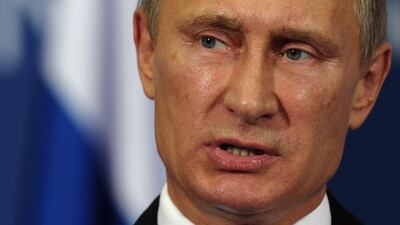There is a new campaign within the foreign policy establishment in Washington for arming Ukraine’s military to better confront the Russian-backed separatist forces. There is also a revival in media reports of questions over the history of leading Saudi figures sending funds to Al Qaeda. And in that coincidence lay a certain irony: Saudis funding Osama bin Laden and his network in Afghanistan had been not only acceptable in Washington, but actively encouraged by the United States in the late 1980s.
Back then, proxy warfare was Washington’s chosen method for bleeding the Soviets in Afghanistan. Unable to risk direct confrontation with a rival nuclear power, the US funnelled arms and training, in collaboration principally with Pakistan and Saudi, to indigenous Afghan mujahideen. The “blowback” of that proxy war haunts the West to this day.
Now, Washington is again discussing how to fan the flames of a war thousands of miles away. Several top former US officials and think tank analysts have issued a report advocating the urgent arming of Ukrainian forces. Sanctions had plainly failed to change Moscow’s calculations, the report concluded, and arming the Ukrainians to put up a tougher fight was the only way.
The US and Britain are seriously considering the proposal. Incoming defence secretary Ashton Carter made clear in his confirmation hearing last week that he supports the idea. But western European leaders are aghast. Germany’s chancellor Angela Merkel has warned that “this crisis cannot be resolved by military means.” She and France’s president Francois Hollande flew to Moscow on Friday in the hope of reviving a stalled peace effort.
European concerns are based on the fact that the conflict is unfolding on their doorstep – just as Russia’s reactions to political developments in Kiev over the past 18 months have been framed principally by geography. Some in Washington are well aware that Ukraine’s location as the pathway for any ground invasion of western Russia makes it an indispensable part of Moscow’s strategic defence concept. But what has never been properly acknowledged in the western conversation is the extent to which Russia perceives itself to be under threat by the steady expansion of Nato. This may or may not be a paranoid view, but it shapes the consensus in Russia’s security establishment that it cannot tolerate Ukraine being drawn into the Nato alliance.
A laughable revelation in the media last week was that the Pentagon had commissioned psychologists to intuit whether President Vladimir Putin might be suffering from Asperger’s syndrome, as if this might help explain his behaviour. But Russia’s behaviour over Ukraine is not a result of some Putin personality quirk; it’s in keeping with the Russian security establishment’s consensus on keeping Nato off its doorstep.
Armchair strategists in Washington know that there’s no chance of Ukraine holding its own in the face of a concerted Russian military push and that there’s no chance Nato will intervene to save Kiev. What they argue is that boosting Ukrainian firepower will somehow inflict sufficient damage on Russia to force it to accept a political solution on terms it currently rejects.
But many in Washington and Europe see the more likely Russian response as sharp escalation and a war that Moscow would almost certainly win, but at the cost of many thousands more lives.
Moscow’s goal has been to either neutralise Ukraine in geopolitical terms, or else to dismember a western-aligned Ukraine and keep it ungovernable and economically unviable. US officials have encouraged Kiev to dig in its heels in pursuit of Nato and European Union membership. But that’s an unlikely fantasy. Both bodies make decisions by consensus, and neither will be willing to antagonise Russia to the extent of formally absorbing Ukraine. Besides, a deflation-hobbled European Union has no appetite for taking on any more basket-case economies.
And then there’s another Afghanistan – and Syria – lesson: In protracted conflicts, the most extreme elements come to dominate on the militarily weaker side. Even today, most effective and dedicated fighters on the Ukrainian side are not EU-minded liberals, but hard-line ultranationalists. A long-term proxy conflict in Ukraine will probably expand their influence.
A political solution remains the likely outcome in Ukraine because if Russia had intended to invade and occupy the whole country, it would have probably done so already. It is not the strength of Ukraine’s military or the fear of Nato intervention that’s currently holding Moscow back. Instead, Moscow is offering terms, even if these are unpalatable to Kiev, Washington and western European governments. Since the last truce, the separatists have added hundreds of square miles to the territory they control and they aren’t likely to cede them. Instead, Mr Putin will seek international recognition of the new front lines as marking off an autonomous, Russia-aligned chunk of eastern Ukraine.
The current Russian-backed offensive appears designed to inflict a tactical defeat on Ukrainian forces and force Kiev to accept a humiliating deal. As unpalatable as that outcome may be to Europe, they are likely to see the alternative as far worse. But proposals to arm the Ukrainians to put up a better fight in a war they can’t win will receive support in Washington, where remote-control mayhem is a more established habit.
Tony Karon teaches in the graduate programme at the New School in New York

